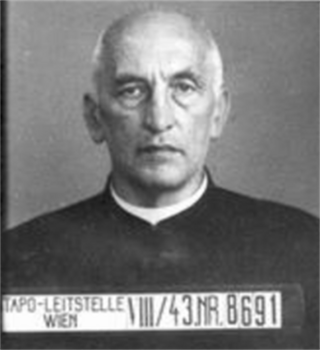DDr. Ferdinand Frodl SJ

Personalia
Born:
Died:
Profession:
Persecution:
Imprisonment 29.07.1943 - 06.04.1945
Memberships
Curriculum Vitae
Ferdinand Frodl attends five classes of primary school and three classes of secondary school in Vienna. He initially learns the locksmith's trade from his father for two years and becomes a member of the youth of the Marianische Kongregation in Vienna III. He then completes the vocational training school and in two years the four years of the Technologisches Gewerbemuseum (TGM), taking Latin and Greek lessons on the side.
In 1907 - declared unfit for military service - he entered the Society of Jesus in St. Andrä as a novice; in 1910, he completed secondary school at Kollegium Kalksburg and began philosophical and theological studies in Bratislava and Innsbruck.
In 1916, he was ordained a priest. After obtaining his doctorate in theology in 1918, he completed his studies in political science with a further doctorate in 1925. In 1939, he was appointed rector of the Klagenfurt seminary.
He was subsequently forced to relocate the seminary to St. Georgen am Längsee, as demanded by the National Socialists. Here he comes into contact with the "Antifascist Freedom Movement of Austria" (AFÖ). Franz Bernthaler introduces him to the leaflet distribution campaign. Through Dr. Granig, he was also introduced to Eduard Pumpernig [formerly Frater Benno OFM], who was appointed liaison officer.
This collaboration did not go unnoticed by the Gestapo. Ferdinand Frodl was then arrested on 29 July 1943 by the Klagenfurt police station as part of the arrests of AFÖ members "for working for a legitimist secret organization" and transferred to remand prison 1 in Vienna.
"Due to his anti-Nazi attitude, Dr. Frodl is to be described as an opponent of the state and his anti-state activities were likely to endanger the welfare of the Reich" - according to the Vienna Stapo headquarters.
The 5th Senate of the People's Court (VGH), which convened in Vienna from 9 to 11 August 1944 under the chairmanship of Dr. Albrecht from Berlin, indicted 13 members of the AFÖ, seven of whom were sentenced to death.
From the indictment of the Chief Reich Prosecutor at the People's Court, May 25, 1944:
"The accused Frodl stated that he, as the then head of the seminary, had planned a business trip to Berlin to see the nuncio in the spring of 1943. This had become known in the episcopal finance chamber in Klagenfurt, where the accused [Franz] Bernthaler was employed, and Bernthaler had now approached him with the request to take political appeals to Berlin with him, which were to be brought abroad via the nunciature and distributed from there by radio. However, he had refused to carry the letters with the appeals because he knew that the nuncio only sent letters abroad that concerned ecclesiastical matters. At Bernthaler's insistence, he then suggested that the leaflets be sent abroad via a consul of a foreign power in Vienna. He was thinking of a consul whom he did not know personally, but of whom he had heard that he had campaigned for Austrian Jews of Catholic denomination [...]. Shortly afterwards, Bernthaler had brought him an open envelope containing two anti-government pamphlets. As the pamphlets were full of stylistic and spelling mistakes, he considered them unsuitable for distribution and burned them."
Ferdinand Frodl was sentenced "for failure to report the crime" to three years in prison, taking into account the protective custody he had suffered so far. "The defendant Frodl was aware of the anti-state intentions of the defendant Bernthaler to take the aforementioned appeal abroad and failed to report it to the authorities as required" - according to the grounds for the sentence. He saved himself from the death penalty "through his skill in self-defense". On April 6, 1945, he was arrested in the course of the collapse of National Socialist rule.
Citations
- Fritz, Herbert/Krause, Peter (2013): Farbe tragen, Farbe bekennen 1938–45. Katholische Korporierte in Widerstand und Verfolgung. (ÖVfStG, 2013), p. 290.
